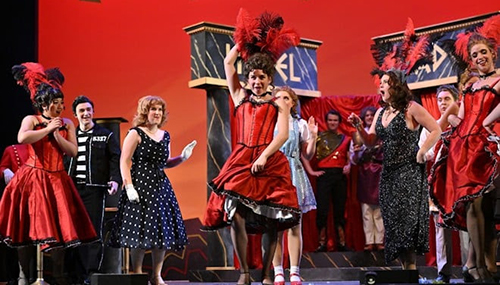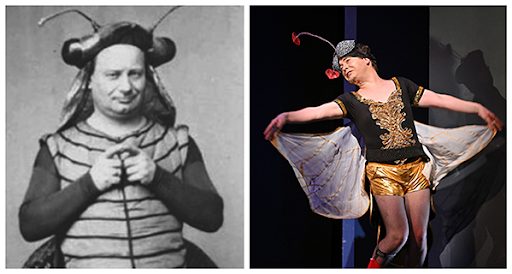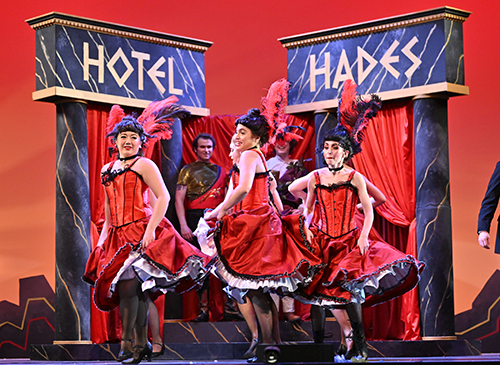by Daniel Hathaway

Ohio Light Opera shows why in the production I saw — cleverly staged by Steven Daigle, brightly conducted by Michael Borowitz, and colorfully designed by Daniel Hobbs — in its opening performance at Freedlander Theatre at the College of Wooster on July 13. Satire can scarcely ever be overdone, and the opportunity to skewer society’s sacred cows — or its gods — opens many doors wide.
In this case, instead of portraying Orpheus with his lute (who in Shakespeare’s words, “made trees, And the mountain tops that freeze, Bow themselves when he did sing”), Offenbach gives the title character — acrobatically played by Jack Murphy — a violin, the instrument often associated with the Devil, and casts him in the pastoral role of a shepherd who is boring his wife, Euridice (the expressive Christine Price), with his new creations. He’s also involved in various dalliances with his fiddle students (plus ça change, n’est-ce pas?). And Murphy’s mimicking of violin playing was very convincing.
Euridice responds by involving herself with the shepherd Aristeus (Nicholas Orth), who is really Pluto, the god of the Underworld, in disguise. Things get complicated when Euridice is murdered in a revenge move and is as happy to accompany the now-unmasked Pluto to the regions down below as Orpheus is to be free of his spouse to spend more time with his students. The gods also decide to take a trip to the nether regions, recognizing a good party when they’re not invited to it.
Jupiter (Vincent Gover) sees all of this going on from his lofty seat in Olympus, and accompanied by Public Opinion (Bergen Price), decides to intervene and descends to the Underworld to visit the now-bored Euridice, who is being held under lock and key by the discredited former King of Boeotia, John Styx (James Mitchell).
Jupiter shape-shifts into a fruit fly to gain entrance through a keyhole, which sets up what has to be one of the most memorable comic scenes in theater. Gover’s hysterical portrayal of a fly in heat (decked out in a diaphanous costume by Brooke Kester that only improves on the 1858 original) was a real show-stopper and deserved at least an “R” rating.
Once we had picked ourselves up off the floor, the story resumed with Orpheus agreeing to take the reluctant Euridice back (her facial expressions were priceless), provided that he doesn’t look back at her on the way out. We know how well that works out. Rescued from salvation by Jupiter’s well-aimed thunderbolt, Euridice decides that Hades isn’t such a bad place after all. She reinvents herself as a follower of Bacchus, and the entire party gathered at Hotel Hades joins in a celebratory can-can — choreographed by Spencer Reese with some clever sight gags added.
Among the other splendid moments of comic acting: the wide-ranging opening aria from Aristeus (Nicholas Orth), which easily covers three octaves. And in addition to its more obvious parodies and fun-pokings, Orpheus is so full of musical quotes and societal references that instead of running supertitles, productions might consider projecting footnotes. “Go to Hell” has never been so attractive an invitation!
Published on ClevelandClassical.com July 20, 2023
Click here for a printable copy of this article





